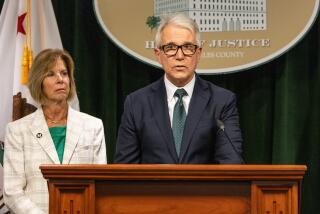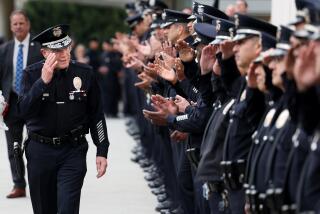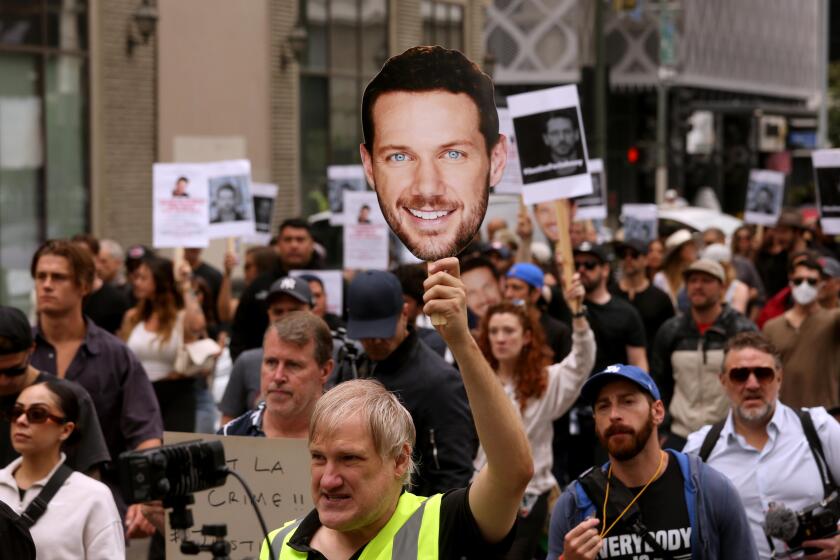Hundreds Mourn Slain LAPD Officer
Salutes snapped. An infant wailed. Bagpipes shrieked. A horse with no rider--just knee-high boots facing backward in the stirrups--snorted under the dreary sky.
And Los Angeles Police Officer Mario Navidad was buried.
Slain last week in a gunfight over two six-packs of beer, Navidad was honored Monday as a martyr, a warm, dedicated and courageous officer who lived and died by his vow to protect and to serve. “He had a passion to serve his community,” Capt. John Mutz recalled. “He always gave 100 percent.”
Hundreds of officers from across Southern California stood at grim attention, black bands draped over their badges, as a police honor guard marched Navidad’s polished wooden casket to his grave in Forest Lawn Memorial Park and Mortuary in the Hollywood Hills. Navidad’s widow, Sandra, clutched their gurgling 9-month-old baby to her chest and held the hand of their 4-year-old son as she walked, tearful and trembling, behind the casket to a private graveside service.
“A real tragedy,” a family friend murmured. “He was a very special person.”
Navidad, 27, was killed three days before Christmas when he and his partner confronted a teenager suspected of stealing beer from a convenience store on Fairfax Avenue. The suspected shoplifter also died in the shootout.
At a funeral Mass celebrated in the Church of St. Mark in Venice on Monday morning, Mutz and two police chaplains recalled Navidad’s love of police work--from his determination to keep himself in good shape and his zeal to pursue every lead in an investigation to his willingness to help anyone in need.
“He gave of himself each time he put on his badge and went to work for the city of Los Angeles,” said Mutz, who commanded Navidad in the Wilshire Division. Though Navidad had been on the force for just 21 months, Mutz said he had developed the gung-ho tenacity that marks outstanding officers, without ever losing his gentle nature. “His courage, his faith, his dedication, his compassion helped him become the kind of police officer who could be relied on by everyone,” Mutz said.
Navidad’s funeral drew at least 500 uniformed officers from as far away as Redondo Beach and Simi Valley, plus a strong contingent from the LAPD, led by Chief Willie L. Williams. Their starched blue uniforms filled nearly every pew, their black-and-whites dominated the parking lot and their police radios crackled quietly even as the Mass was beginning. The funeral procession temporarily shut down northbound lanes of the San Diego Freeway and stretched for miles--car after car with DARE bumper stickers and twirling red lights.
*
But police officers were not the only ones to mourn Navidad.
His former neighbors came. His cousins came. His friends came. His old co-workers from the Royal Market in Culver City came, shyly slipping in among the cops to pay tribute to a man they remembered as a hard worker and devoted father, the kind of guy who batted leadoff for the grocery softball team and who cast aside his customary modesty to proudly show off his son, Brandon, and his baby daughter, Melissa.
Even some strangers came to lay Navidad to rest.
Bonnie Wright showed up wearing a black dress and somber expression, for although she did not know Navidad, her boyfriend worked with him at the Wilshire Division. The funeral frightened her, she said. Made her realize that her own boyfriend, like Navidad, put his life on the line every day. Made her remember, with horror, that any bad guy out there could cut him down.
“This is very scary,” Wright said. “It’s a real reality check.”
A reality check in particular because of how Navidad died: in an incident that should have been routine. Stopping a 17-year-old suspected of shoplifting should have been barely a blip in a 12-hour patrol. Yet Navidad and his partner did not even have time to get out of their car before the suspect whipped out his gun and fired, according to police.
Father Michael McCollough, a police chaplain, reflected on the horror of the killing in his homily at St. Mark’s--the same small church where Navidad was baptized.
Surrounded by incongruously cheerful decorations, including twinkling Christmas trees and bright poinsettia plants, McCollough reflected: “One person points a gun to rob and kill. Another points the weapon to protect and serve. . . . The judgment we will leave for God, but our faith teaches us that [if a police officer dies in the line of duty] then that person dies a martyr’s death and that person is entitled to a martyr’s reward.”
Navidad had dreamed of becoming a police officer for years. He took criminology classes at night while working at the market; he was thrilled when he finally got a chance to enroll in the Police Academy. As a rookie, Capt. Mutz recalled, Navidad used to buttonhole higher-ups in the station and ask how he could improve his skills.
“Mario’s resolve [was] to make the world a better place,” Mutz said.
But as much as her husband loved police work, Sandra Navidad made sure the mourners knew that the LAPD was not his life.
She asked Mutz to talk a bit about Navidad as a father and husband, not just as an officer. She asked him to tell the assembled crowd that even after pulling three 12-hour shifts in a row, Navidad always made time for his kids--and for her. “Sandra was his best friend,” Mutz recalled.
The Navidads would have celebrated their fifth anniversary in January. They recently bought a house.
To help Sandra Navidad raise the children, the Police Department has established a trust fund at the Wilshire Division, taking in more than $45,000 in donations and countless toys for Brandon and Melissa. On Monday, the police honor guard gave Sandra Navidad another gift: the United States flag that had been draped over her husband’s coffin.
Civilian mourners who had never seen a funeral for an officer killed in the line of duty marveled at the solemn ceremony and the huge turnout for Navidad. “It’s a fitting tribute,” family friend Charlie Allen concluded, “to a good person.”










